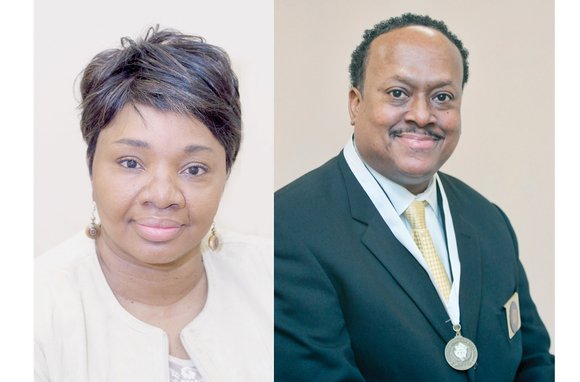Area groups mobilize to register former inmates to vote
5/13/2016, 6:36 a.m.
By Malik Russell
Groups throughout the Richmond region are taking steps to get formerly incarcerated individuals registered to vote and, ultimately, to the polls.
Their efforts are in response to Gov. Terry McAuliffe’s recent executive order restoring the civil and voting rights to more than 200,000 felons who have finished serving their time and completed parole and probation.
“We know that it is important to not only support the governor in returning civil rights to people who have served their time, but also to make sure that we both increase the voter rolls and get folks to the polls,” said Lillie Branch-Kennedy, founder of Resources, Information and Help for the Disadvantaged (RIHD), a Richmond-based group advocating for the rights of incarcerated individuals and their families.
Last weekend, RIHD helped create the Mid-Atlantic Cornerstone Civic Engagement Coalition, a collection of organizations from Richmond, Washington and Baltimore pooling resources to conduct grassroots outreach aimed particularly at people who previously were imprisoned.
RIHD is teaming with Richard Walker, a former felon and founder of Bridging the Gap in Virginia, another Richmond-based advocacy group committed to restoration of rights, to kick off its 5th Annual Mobile Justice Tour in Virginia, a regional tour with stops in 10 to 15 places to push for sentencing reforms and to register former inmates to vote.
“What we realized is that the people in D.C. and Baltimore are facing the same problems we are and that there is little to no funding for the work we do in grassroots communities,” said Mr. Walker. “We realized that we’ve got to pool our resources and unite in sharing information and strategies.”
Since Gov. McAuliffe announced the executive order April 22, Republican leaders in the General Assembly have threatened a lawsuit challenging the order, and have questioned why violent offenders now should be eligible to serve on juries because their rights are restored.
On Wednesday, Gov. McAuliffe’s office released data from an analysis of the more than 200,000 individuals whose rights were restored. The results show that more than 79 percent of the former inmates had been convicted of nonviolent offenses.
The data also shows that 51.5 percent of the former felons are white people, while African-Americans “accounted for 45.9 percent of the disenfranchised population” despite African-Americans comprising only 19.4 percent of the state’s total population.
Jack W. Gravely, executive director of the Virginia State NAACP, said he found the data “enlightening.”
It “dispels some of the hysteria surrounding the governor’s executive order,” he said, because it indicates that most of those whose rights were restored “are above age 50, nonviolent offenders, have been out for 11 years and want to be good citizens. This speaks well for them and the courageous step taken by Gov. McAuliffe,” he added.
Despite the data showing nonviolent offenders overwhelmingly represent the majority of those regaining their rights, GOP leaders remain opposed to the mass restoration of rights.
House Speaker William J. Howell, a Stafford County Republican, demanded again Tuesday that Gov. McAuliffe release information on the 40,000 violent offenders whose rights were restored.
“To call this (information) irrelevant is a direct insult to the victims of these violent crimes,” Speaker Howell said. “The governor needs to explain why he thinks violent criminals should have the right to serve on juries that have an obligation to uphold the law.”
He also called the information “delayed, incomplete and unverified.”
“We continue to press forward with our legal challenge,” Speaker Howell said. “Our legal team is working quickly to prepare a challenge to the governor’s executive order, and we plan to move forward very soon.”
Hoping to stem the tide of rumor and myth, local leaders also are organizing events to educate communities, advocates and formerly incarcerated individuals on their right to vote.
A town hall will be held 6:30 to 8 p.m. Thursday, May 12, by Richmond Delegate Delores L. McQuinn, Henrico Sen. A. Donald McEachin, former Secretary of the Commonwealth Levar Stoney, City Council President Michelle R. Mosby and many others at Thirty-first Street Baptist Church, 823 N. 31st St., in the East End.
Gov. McAuliffe is expected to attend.
Others groups are uniting as well to help former inmates.
“We’ve got to strike while the iron is hot,” said Keith Hicks, a board member of the Richmond Crusade for Voters.
The Crusade is partnering with Lisa Davis, founder of the Community Empowerment Alliance to hold a voter engagement and outreach event 9 a.m. to noon Saturday, May 14, at the Peter Paul Development Center, 1708 N. 22nd St., in Church Hill. The event will kick off a day of voter outreach and canvassing with the goal of registering 500 to 1,000 new voters throughout the city and surrounding counties.
Volunteers from the alliance also will be providing information from 9 a.m. to 5 p.m. Saturday, May 14, at Applebee’s restaurants at 4306 S. Laburnum Ave., near The Shops at White Oak Village, and at 10151 Brook Road, near Virginia Center Commons.
Ms. Davis points out that while former felons are the audience the alliance is targeting, the goal is to educate and register anyone, who for whatever reason, has opted out of participation in the political process.
“It’s important not to simply say that you need to vote but to educate the community on the process,” she said. “It’s important to share what you know because, for some people, it might be, ‘Where do I go to vote?’ or ‘How do I register to vote?’ Some people don’t know where to start.”







